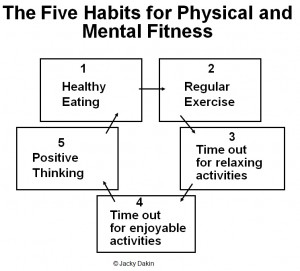Work on wellbeing by keeping your mind and body strong and healthy so as to stay ahead of the game.

Are you a gunna? Do you constantly decide to eat better, do more exercise and take time out for yourself? And then not do it? Don’t worry you’re not alone. We all cave in to time and work pressures despite our good intentions.
Here are some reasons to motivate you towards better self care and turning any health downsides upwards again.
Just as physical fitness is important for good health, energy and longevity, so is staying mentally fit. Both types of fitness contribute to a strong and healthy immune system. They are the body’s defense system against disease and keep us well and alive.
We all know that a good balanced diet and regular exercise are essential for physical fitness. Well your mind is just like your body. If you exercise it properly and look after it, you can expect to stay mentally fit and get a lot more out of life.
It is important to take regular breaks from the pressures of life. On a daily basis, focusing for even a short time on mental fitness strategies will provide immediate positive benefits and build mental resilience. You will feel more alert and alive and have the energy to do what is required of you and what you want to do.
You all know the critical factors for staying physically well and creating mental fitness. Here are my five habits with some tips following:

1. Healthy Eating
You’ve heard the saying “We are what we eat”? Well it’s true. Healthy eaters have better attention spans, more energy and a stronger ability to ward off sickness.
Overeating is definitely not good for you and sometimes time pressures or mental health issues cause you to skip meals, which is equally bad for the body. If you don’t put enough fuel in your car what happens? Yes – it stops running and so will your body without sufficient nutrition. Eat healthy meals three times a day if you can and don’t skip.
2. Regular Exercise
Research has shown that regular physical activity improves physical and psychological well-being and can reduce depression and anxiety. Exercise is active relaxation and a great tension reliever. Exercising for around 30 minutes three times a week can reduce stress.
It is good to find an ‘exercise buddy’ as this helps to motivate you to keep at it. If the gym is a real turn off for you try walking. Finish up with a visit to a local café, although perhaps avoid the chocolate cake! Walking is great for both exercise and stress relief.
 3. Time Out for Relaxing Activities
3. Time Out for Relaxing Activities
While active relaxation is great for tension relief, it is passive relaxation which actually counteracts the stress response. It slows us down mentally and physically. Many of us are sadly lacking in ‘Me Time’ yet this is important to achieve work/life balance. Create wellbeing by ‘switching off’ from time to time.
So what works? Try meditation, relaxation tapes, yoga or massage. Gardening, a slow walk, pleasant reading and a range of crafts are all relaxing activities. Listening to gentle music, having a spa, bath, or shower helps to wind down. Make time to chill out.
4. Time Out for Enjoyable Activities
You will have heard the saying ‘Get a life!’ Pleasant social activities enhance wellbeing. Recent research has indicated that the happiest people are those with the largest social networks. Have fun with family time or socialise with friends.
Take up a hobby to help balance your life. Plan a holiday or a weekend away to get out of the ‘rat race’ or just to provide a change of environment and some breathing space. A little humour can go a long way to keeping us mentally fit. Watch comedies or read amusing books. Let yourself have a laugh.
Contact with animals can help us emotionally, psychologically, and socially. They provide companionship, safety and comfort through the power of touch. Having a pet can lessen the chance of heart attacks and isolated people without support have been found to have less depression if they have a pet. Try animal magic.
5. Positive Thinking
It has long been asserted by therapists and counsellors that positive thoughts can help create positive outcomes. It is reassuring that recent research on brain plasticity supports this. Therefore, it is critically important to take control of your internal self-talk. Learn to change negative to positive thoughts.
While they might seem true in the moment, be aware that many thoughts are not true. Under stress or if you are anxious or depressed, your mind plays tricks on you. So don’t believe the negative thoughts, send them away and replace them with a more positive thought. If you are struggling with thinking positively, just keep at it and with practice you will get better. Optimists live longer and cope better with stress, conflict, uncertainty and change. Positive thinking is a powerful aid to good health, good luck and happiness!
For your wellbeing’s sake give the five habits a go.
